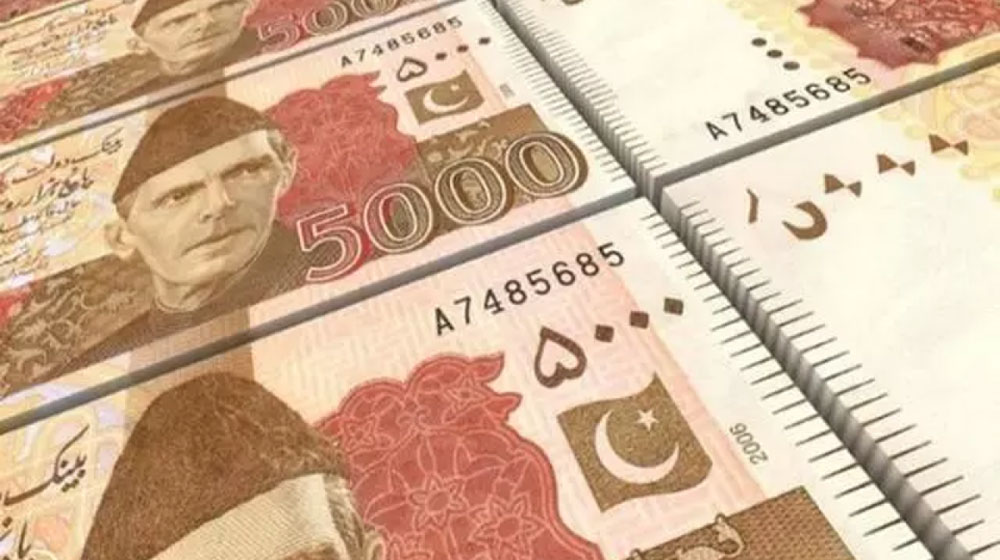The former head of the Federal Board of Revenue (FBR), Syed Shabbar Zaidi tweeted that the Government of Pakistan should demonetize the Rs. 5,000 notes from July 2021.
The tweet read: “5000 Rupee Notes. Demonetize from July 1, 2021. Announce two months earlier”.
He highlighted that the government should announce the plan in advance for a smooth “transition” period, adding that the act would make bribery difficult, and that those hoarding gold in lockers must inform the government if they are holding bullion, and that the government should monitor bullion trading.
5000 Rupee Notes. Demonetise from July 1, 2021. Announce two months earlier: transition. Opponents no idea about abuse. Vested interests. Economy will improve. Banking prosper. Bribery to be made difficult. Lockers holders to intimate if bullion held. Bullion trading monitored.
— SyedShabbarZaidi (@SShabbarZaidi) January 22, 2021
ALSO READ
Ministry of Finance Clarifies Position on the Issuance of Sukuk
While the tweet has garnered some approval on social media, it is being criticized by economists and those familiar with the workings of an economic system.
This is not the first time that such a suggestion has caught attention in Pakistan’s media and government offices. In 2016, the government had dismissed a recommendation from the Upper House of the Parliament to scrap the Rs. 5,000 banknote.
Although the underlying reasons for the suggestion had been the same that Zaidi has highlighted, the Ministry of Finance had advocated against it, saying, “Given the continuing use of cash in transactions, the government believes that discontinuation of the 5,000 rupee note would adversely affect the efficiency of exchange in business”.
Many notable economic journalists have reacted to Zaidi’s tweet by sharing the history of the Rs. 5,000 note and why it will be a catastrophic mistake to heed his suggestion. The business and economy columnist, Khurram Hussain, wrote, “Demonetization has its risks if undertaken suddenly as it was done in India, and also if it hits those notes that are widely used by the poor and in retail transactions”.
He does, however, seem to approve of the idea of slowly taking the note out of circulation without making it a sudden policy change, and stated, “In the case of the Rs. 5,000 note, simply easing it out of circulation is relatively straightforward. First, you discontinue printing new ones and let those that are already in circulation continue. All currency notes eventually come back to the State Bank once they are sufficiently soiled or damaged due to circulation, and some amount of natural attrition can be allowed to take these bills out of the market”.
Hussain added that “Then the government can announce a long timeline, perhaps a full year, following which the note will be demonetized. The process can take a few years to complete, but will not be anywhere nearly as destructive of economic activity as the demonetization in India has been, since it can compensate for the destruction of the note by printing more Rs. 1,000 notes in tandem”.
Salman Shah, who is the caretaker Minister for Finance and a noteworthy economist, opposes the notion of a gradual shift in currency circulation unless there is a better and functioning alternative in place to counter its disruptive impacts.
Speaking with ProPakistani, Shah said, “It’s a stupid thing to do because it will disrupt the rural economy because the rural economy is the cash economy. In that, if you take this 5,000 rupee note out of the equation, let’s say cattle markets for example, which are held all over Punjab and it is all on cash. Other rural markets and agricultural markets are all cash, so this demonetization will disrupt the rural economy”.
ALSO READ
Bank Branches Should Accept Taxpayers’ Cheques of Different Banks: SBP
He said that the act will potentially disrupt the urban economy, and it is always a “stupid” idea to undertake such a move to achieve any other objective as long as the impact is the disruption of the economy.
Shah further emphasized, “This is the lesson that India has learned. On paper, it looks very good, but in practice, it can really destroy the economy,” adding that such changes are best made with a functional alternative in place that has started to take over, and that “if it is a good alternative, it will automatically replace the old one”.
He also explained that the digitization of Pakistan’s economy and mobile wallets, and the ushering of the rural economy into the digital fold is one such alternative that will automatically replace the need and usage of the Rs. 5,000 banknote after sufficient expansion of the digitization.






















EVERY THREE YEAR : NOTES SHOULD BE CHANGE OR REPLACE OLD TO NEW TO STOPPED SPEED MONEY AND CORRUPTIONXX:
isi kaam lagy rahien bs?
Just stop printing 5000 PKR notes and keep those in circulation.
The caretaker Finance Minister is right. Until there is an alternative, the move should be postponed. This move would be targeted at people who hide their businesses, and they will just shift to USD and other foreign currencies in absence of 5000 note. The people that will suffer the most is common honest people, like always with every policy of govt.
The govt. should think of solutions that are both efficient and people friendly.
Bhai yeh kaam India kr k kaafi kamiyaab ho bhi gaya hai. Aur hume ab idea arahe hain, woh bhi un logo ko jo ab decision maker hi nahi rahe…. Wahh!!